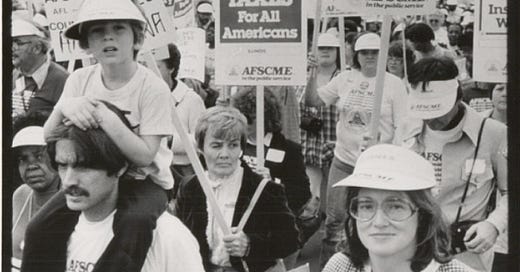The Laundry List
If 2024 voters don't heed the 1972 warning, the people of 2076 will pay the price.
In March of 1972, Congress passed the Equal Rights Amendment (ERA) guaranteeing women equality of rights. The Constitutional Amendment was then sent back to the states for ratification. Champions were given just over a decade to rally support in thirty-eight states. It took thirty-eight years, but in 2020, Virginia became the thirty-eighth state to ratify Constitutional recognition for women.
But something else was weighing on George McGovern in March of 1972. The 526,651 primary voters in Florida who voted for George Wallace. McGovern reflected on the fact that a half of a million Democrats in Florida voted for a known racist for nine days.
States began establishing primaries in 1890. Soon, Southern Democrats began using it as a tool of voter suppression. Florida established a closed primary in 1913 and by 1921 the State of Texas was being hauled in front of the Supreme Court for prohibiting black Texans from voting in primaries. “Whites Only Primaries” prompted Oliver Wendell Holmes to write, “It seems to us hard to imagine a more direct and obvious infringement of the Fourteenth Amendment.”
“It is one of those little ironies of which Southern politics is full, that the primary movement, which was motivated at least in part, by democratic motives and a desire for wider participation in the representative process, was turned into a device for eliminating millions of Negroes from participation in government.”
Thurgood Marshall
Fifty years after Justice Holmes penned those words, McGovern concluded that attacking the Wallace voters for “simply being racist” was a mistake. He told a Milwaukee audience that he agrees that the “Governor is an extremist” But that he also believes “many of the people who supported the Governor did so because they are deeply frustrated and disgusted with the way their government is ignoring their concerns and interests.”
And The Message They Delivered Was Pretty Clear
McGovern believed that “voters in this country are smart enough to know that the Governor is not a big enough man to govern this entire nation and its affairs with other nations.” Two months later, an assassination attempt effectively ended the Wallace campaign but not before 3,755, 424 voters chose a hero of segregation.
"Segregation now, segregation tomorrow, segregation forever."
George Wallace
As he reflected on the Wallace voter, McGovern downplayed the role racism played. In hindsight, there is little doubt that nearly four million people chose Wallace because they were in alignment with his racism. Regardless, that doesn’t mean there isn’t more to learn from the mood of the nation fifty-two years ago. Let’s compare that March 1972 speech to what Americans are feeling today.
They Are Fed Up
In McGovern’s words, Americans were fed up. Fed up with -
“The same old Washington politicians giving them a lot of talk about what needs to be changed in the country and then, once they get elected, changing nothing at all.”
“Being told that the war is going to end and never seeing an end to the war.”
“Being told that the economy is going to pick up and unemployment is going to go down - and never seeing either of those things happen.”
“Being told inflation is going to stop and prices are going down - and every time they shop for groceries, prices are higher this week than last.”
“Being told that their taxes are not going to go up any more - and seeing their taxes raised while their take-home pay drops.”
“Being told that their neighborhoods are going to be safe and clean - and seeing the city become more unsafe than ever before.”
In short, McGovern said, “they are fed up with being ignored by politicians who keep asking for money to solve problems that never get solved.” Sound familiar?
They Are Fed Up & They Are Mad
Fifty-two years ago, in 1972, McGovern believed “that Wallace and Nixon want people to think so much about bussing that they forget whether they have a job or not; whether the job they have is safe, secure, or even bearable; whether their pay raise is higher than their tax increase; whether they can afford the property taxes on their homes and the sales taxes on everything else; whether the streets are dirtier than they used to be; whether their kids are learning to read and write and add…”
He went on to recognize that people are “afraid of getting sick because they can’t lose a week’s wages or be wiped out by hospital bills only the very rich can afford,” before concluding that Americans are “shouting out the laundry list of (his) problems and “(he) is tired of being taken to the cleaners.”
Economic Bill of Rights
McGovern ended his remarks with a call for a new Economic Bill of Rights. His Bill of Rights was built on a livable wage, Social Security payments that increase with the cost of living, and comprehensive tax reform.
The McGovern tax reform proposal included reducing loopholes like “oil depletion allowances and other gimmicks” for $28 billion dollars in new revenue. He called for a $32 billion dollar infusion into the economy as the war in Vietnam concludes. Dollars, he said, that should be used to reduce property tax, level school funding, create jobs, and serve hot lunches to school children and meals for elderly and disabled Americans. He envisions those dollars going toward affordable healthcare and pollution remediation.
Before asking for their vote, McGovern reminded the audience that “it is time for a return to fair play, self-respect, and pride.”
Do You Think Enough Has Changed?
The 2024 election is shaping up to be a mirror imagine of 1972. Taxes. Pay. Healthcare. Conservation. War. And Racism.
Fifty-two years ago voters were fed up, frustrated, mad and afraid enough to sit out the 1972 election. We can not afford to make that mistake again. The voters of 2076 are counting on us.




